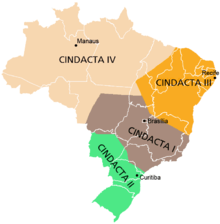CINDACTA

The air traffic control centers of Brazil are known by the acronym CINDACTA, or "Centro Integrado de Defesa Aérea e Controle de Tráfego Aéreo (Integrated Air Traffic Control and Air Defense Center). Four CINDACTAs are in operation, located in four different cities and each responsible for different regions of Brazil's airspace.
- Cindacta I located in Brasília, near Pres. Juscelino Kubitschek International Airport: the square comprising Rio de Janeiro, São Paulo, Belo Horizonte and Brasília[1]
- Cindacta II located in Curitiba, near Bacacheri Airport: Southern Region, Mato Grosso do Sul and the southern part of São Paulo[2]
- Cindacta III located in Recife, near Recife/Guararapes-Gilberto Freyre International Airport: Northeast Region and the ocean between Brazil and Africa and Europe[3]
- Cindacta IV located in Manaus, near Eduardo Gomes International Airport: Brazilian Amazon Region[4]
The use of military air traffic controllers for civilian traffic is not unusual, but has been deprecated in most developed countries. In the US, the Federal Aviation Administration (FAA) operates a wholly parallel system with that of the US Air Force and NORAD. This is also the case of Eurocontrol and each of its member nations' air defense systems. Brazil's use of an integrated command poses some unique challenges to the government. As members of the military, controllers are not allowed to form unions (such as the case of NATCA in the US) or to strike.
While the air traffic control system saw significant improvement with the implementation of SIVAM in the northern portion of the country, there were many warning signs that the system as a whole was heading towards an untenable situation. In 2003, the Brazilian Air Force warned of the need for upgraded equipment and additional funding. For three years, DECEA, the Air Force department in charge of air traffic control budget requests were denied.[5] The government's Tribunal de Contas da União (Union Accounting Tribunal), an agency similar to the US Government Accountability Office, issued a report after the crisis which echoed the FAB's concerns, stating that a lack of planning and underfunding of the air traffic control system by the federal government was to blame for the crisis.[6]
References
- ↑ "Cindacta I" (in Portuguese). DECEA. Retrieved 6 May 2010.
- ↑ "Cindacta II" (in Portuguese). DECEA. Retrieved 6 May 2010.
- ↑ "Cindacta III" (in Portuguese). DECEA. Retrieved 6 May 2010.
- ↑ "Cindacta IV" (in Portuguese). DECEA. Retrieved 6 May 2010.
- ↑ (Portuguese)FAB warns of crisis since 2004. O Estado de S. Paulo. Retrieved July 22, 2007.
- ↑ (Portuguese)Budget cut and lack of planning caused air crisis, says TCU report Agência Brasil. Retrieved July 22, 2007.